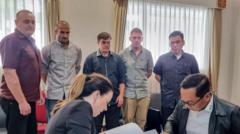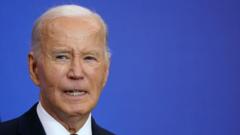Owas Mwape, a prominent actor in Zambia, confronts societal taboos surrounding drug addiction by sharing his own family's battle. With his son's struggles amplifying the urgent need for awareness, Mwape encourages discussions around rehabilitation and the experiences of other families facing similar challenges.
Breaking the Silence: Owas Mwape's Courageous Call for Change in Zambia's Drug Crisis

Breaking the Silence: Owas Mwape's Courageous Call for Change in Zambia's Drug Crisis
Renowned Zambian actor Owas Mwape publicly shares his struggles with his son's drug addiction, aiming to combat stigma and inspire other families.
In a courageous act that challenges longstanding social norms, Zambian actor and filmmaker Owas Mwape has opened up about his family's heart-wrenching experience with drug addiction. Recently, he took to Facebook to request advice and support as he faces the grim reality of his son Mayamiko's substance abuse, shattering a societal taboo that often leaves parents isolated in their struggle.
Mwape, a beloved public figure at 52 years old, recognized the pervasive issue of drug addiction in Zambia and felt compelled to use his platform to raise awareness. "Most parents hide such kind of things, they're hiding their children," he remarked, underscoring the importance of acknowledging the drug crisis as a pressing issue that extends to all households. With five sons and a daughter, he understands too well the difficulty of confronting such a painful truth.
Mayamiko, now 23, began exhibiting troubling behavior during his teenage years. The signs were subtle at first: money vanished from Mwape's bank account, leading to the discovery that Mayamiko had hacked his father's phone and stolen nearly $3,000 over two years. What followed were petty thefts and ultimately a heartbreaking moment when Mayamiko fled to live on the streets, just before his final school exams.
"His whole demeanour changes when he's on drugs," Mwape described, reflecting on the profound impact of addiction on his once-sparkling son. Despite the heartache, he believes in the power of forgiveness and support, drawing wisdom from an African proverb: "Your child is like an axe; it will hammer you, and you pick it up and put it on your shoulder."
Though Mayamiko is back in contact with his father, their conversations are fraught with challenges. The young man often contacts his father using different phone numbers, complicating their communication. Nevertheless, Mwape clings to hope, emphasizing that real change hinges on Mayamiko's willingness to seek help.
During a recent interview, with both father and son present, Mwape posed an essential question about gaining employment and staying drug-free. Mayamiko expressed a desire for change, albeit hesitantly. Yet the ongoing uncertainty about what drugs he consumes and how he acquires them remains a source of frustration for Mwape.
In his quest for solutions, Mwape's social media plea resonated within the community, unveiling that many parents share similar struggles but have hidden them due to the stigma surrounding drug addiction. Currently, Zambia lacks publicly funded rehab centers, leading some families to seek help abroad, even in China.
The filmmaking journey for Mwape and his family has transformed significantly, with recent projects addressing the issue of drugs in educational settings. His cinematic narratives aim to cast a light on the harsh realities many families face while stressing the importance of proactive parental involvement in children's lives.
As Zambia's Drug Enforcement Commission (DEC) reports a staggering increase in drug abuse incidents, they are met with the challenge of addressing broken familial structures as a contributing factor. The DEC, led by Nason Banda, aims to foster rehabilitation and prevention, steering away from punitive measures.
Owas Mwape's courageous decision to share his struggles serves as a beacon of hope not only for his family but for others wrestling with similar challenges. With his journey serving as a rallying cry, he aspires for society to confront its denial of addiction, encouraging open discussions that could pave the way for healing and recovery.
"Sometimes, battles are never won by simply getting into battle - battles are won by employing strategy," Mwape concluded, hopeful that the collective effort will lead to better outcomes for all families affected by addiction.
















